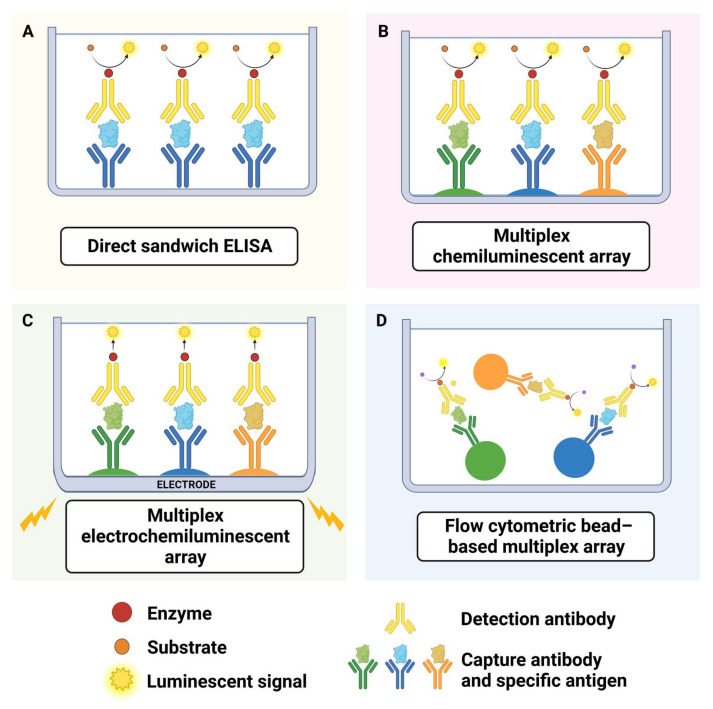ELISA and cytometric bead array-based cytokine analysis is indispensable for the precise quantification of soluble immune mediators, providing critical insights into inflammatory status, immune cell activation, and pathological mechanisms. Creative Biolabs' ELISA and Cytometric bead array-based Cytokine Analysis Service delivers comprehensive in vitro cytokine profiling utilizing both ELISA and cytometric bead array technologies, enabling robust and specific detection of a broad spectrum of pro- and anti-inflammatory cytokines, chemokines, and growth factors. The key advantages of our offering lie in its high sensitivity, wide dynamic range, multiplexing capability for efficient multi-analyte detection from minimal sample volumes, and rigorous quality control ensuring exceptional reproducibility and accuracy.
ELISA and cytometric bead array represent two cornerstone technologies for the quantitative detection of cytokines secreted by immune cells. While traditional ELISA provides high-sensitivity measurement of a single analyte, bead-based cytometric bead array platforms enable the simultaneous multiplexed quantification of multiple cytokines within a single sample. These assays are indispensable for precisely characterizing the immune response, allowing researchers to decipher complex cytokine profiles and gain critical insights into immune cells activation states under both physiological and pathological conditions.
 Fig.1 Array-based platforms for cytokine release quantification.1
Fig.1 Array-based platforms for cytokine release quantification.1
Creative Biolabs' ELISA and Cytometric bead array-based Cytokine Analysis Service provides optimized cytokine analysis services tailored to diverse research needs. Our platform enables precise and reliable detection of cytokines across multiple species. Furthermore, the cytometric bead array -based approach extends its utility to complex biological matrices such as serum and tissue culture supernatants, facilitating comprehensive cytokine profiling in various experimental settings. With a commitment to accuracy and reproducibility, we support drug development and immunology studies through robust, species-flexible, and matrix-adaptable analytical solutions.
We provide a multi-tiered technical portfolio for cytokine analysis, designed to deliver solutions ranging from robust classical quantification to high-plex multiplexing, ensuring both reliability and efficiency for diverse research needs.

Required starting materials:
Key Steps Involved:

Final Deliverables:
What if I need to know which cells are producing the cytokine, not just the concentration?
That is the power of our integrated approach. We combine the concentration data from cytometric bead array with functional assays like intracellular flow cytometry to link cytokine production directly to specific immune cell phenotypes, providing crucial mechanistic data.
Can your service handle complex cell culture media, like iPSC-derived cellular models?
Absolutely. We have particular expertise in optimizing protocols for complex in vitro functional assays, including those using iPSC-derived microglia and other challenging cellular models for neuroinflammation research. Our rigorous sample processing steps are designed to minimize high background interference common in these lysates.
Building upon advanced technology platforms and deep industry knowledge, we utilize methods such as ELISA and cytometric bead array for multi-cytokine quantification. Our continuous optimization and process integration directly increase the accuracy and throughput of these assays, thereby delivering robust data that supports critical research in drug development and immunology.
"Using Creative Biolabs' ELISA and Cytometric bead array-based Cytokine Analysis Service in our research has significantly improved the detection of low-level central nervous system biomarkers in CSF samples, resolving previous non-concordant data we had from alternative platforms. "— Dr. An Hg.
"The implementation of Creative Biolabs' ELISA and cytometric bead array -based cytokine analysis has streamlined our large-scale in vitro screening workflow. This approach enables us to robustly profile over 20 distinct analytes within microglial supernatants, thereby extracting maximal informational value from our precious, limited-availability iPSC-derived cellular models. "— Prof. Ka Lz.
"Employing Creative Biolabs' ELISA/cytometric bead array and IC Flow services has advanced our understanding of T cell function, successfully pinpointing the specific T helper subset responsible for IFN-γ secretion upon antigen challenge."— Dr. Js Mo.
At Creative Biolabs, we offer an extensive suite of cytokine analysis services, including ELISA and cytometric bead array, coupled with end-to-end CRS management solutions. Our goal is to streamline your research and development process, saving valuable time. To discuss your specific needs, we invite you to reach out to our team.
Reference
For any technical issues or product/service related questions, please leave your information below. Our team will contact you soon.
All products and services are For Research Use Only and CANNOT be used in the treatment or diagnosis of disease.
 NEWSLETTER
NEWSLETTER
The latest newsletter to introduce the latest breaking information, our site updates, field and other scientific news, important events, and insights from industry leaders
LEARN MORE NEWSLETTER NEW SOLUTION
NEW SOLUTION
CellRapeutics™ In Vivo Cell Engineering: One-stop in vivo T/B/NK cell and macrophage engineering services covering vectors construction to function verification.
LEARN MORE SOLUTION NOVEL TECHNOLOGY
NOVEL TECHNOLOGY
Silence™ CAR-T Cell: A novel platform to enhance CAR-T cell immunotherapy by combining RNAi technology to suppress genes that may impede CAR functionality.
LEARN MORE NOVEL TECHNOLOGY NEW SOLUTION
NEW SOLUTION
Canine CAR-T Therapy Development: From early target discovery, CAR design and construction, cell culture, and transfection, to in vitro and in vivo function validation.
LEARN MORE SOLUTION